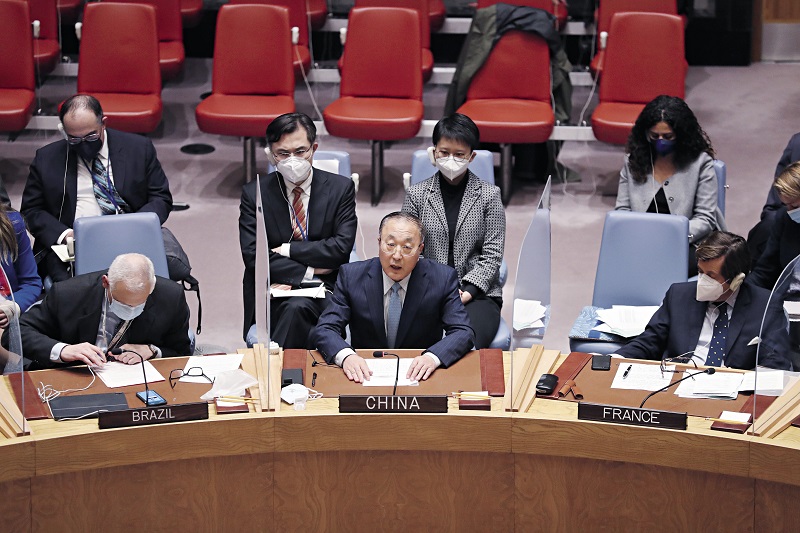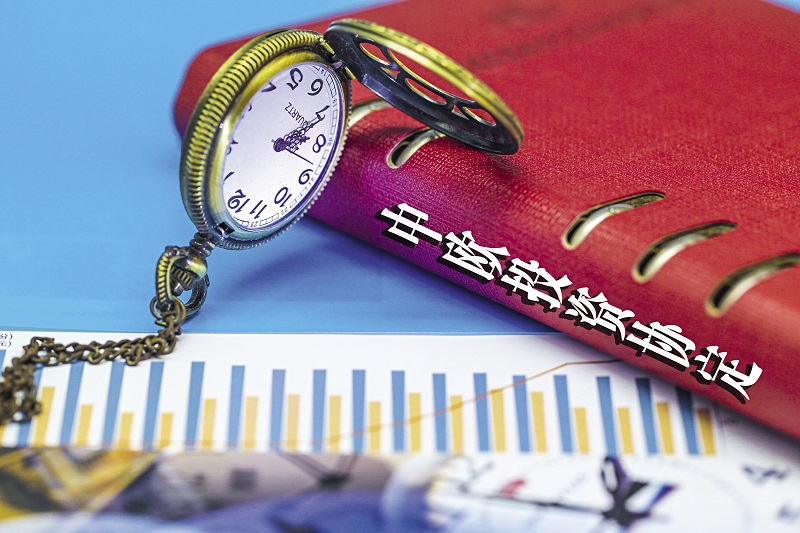Why the EU-China Summit failed to meet the EU’s expectation… and so would other such talks.
It was both extraordinary and incredible to hear EU High Representative for Foreign Affairs and Security Policy Josep Borell, who along with European Council President Charles Michel and European Commission President Ursula von der Leyen took part in the 23rd EU-China Summit on April 1, describe the meeting as “a dialogue of the deaf.”
No doubt from the European Union’s point of view the dialogue with Chinese President Xi Jinping and Premier Li Keqiang was fruitless and unsatisfactory but to equate lack of results to communication with the hearing impaired smacks of a medieval mindset not expected from its top diplomat. If this is the language of diplomacy, then no wonder the EU has been so singularly inept at negotiating a peaceful resolution to the Ukraine crisis.

China’s permanent representative to the UN Zhang Jun speaks during a meeting of the United Nations Security Council in New York City on March 7, 2022. Zhang emphasizes China’s six-point initiative on the humanitarian situation in Ukraine.
Let’s look at the indisputable facts in the China-EU relationship. Last year, China continued to be the EU’s biggest trade partner with the bilateral trade amounting to US $828 billion, a 27.5 percent jump over 2020. But the EU’s growth forecast for this year is 4 percent, down from the 5.3 percent last year, according to the European Commission. In 2023, it is expected to dip further to 2.8 percent. China, on the other hand, is targeting GDP growth of around 5.5 percent, while external assessments predict 5 percent and above.
Given this situation, one would have expected the EU, a bloc that started out as a grouping for greater trade and investment, to give more importance to consolidating its trade relations. The EU-China Comprehensive Agreement on Investment (CAI) has been on the backburner after 35 rounds of negotiations. If passed, CAI would replace bilateral trade agreements between China and the 27 EU member countries, creating a single framework for laws, standards, and more, making China-EU trade faster, more efficient, and transparent.
However, CAI was put on hold last year after the European Parliament voted to do so. The ostensible reasons were the Chinese sanctions on EU officials and think tanks and alleged human rights violations in China. This blame game ignores the fact that the Chinese sanctions were in response to EU sanctions on Chinese officials. Obviously, the EU does not like to be on the receiving end of the treatment it metes out to others.
Borell told the European Parliament after the summit, “We requested China to lift its unacceptable and disproportionate sanctions against European decision-makers, Member of this parliament and national Parliaments, and intellectuals. As long as Chinese countermeasures will be in place, there is no prospect for the ratification process of the Comprehensive Agreement on Investment to move ahead.”
Trade and investment talks accounted for a small part of the dialogue. The EU’s purpose at the summit was to ask China to join the legion of slapping sanctions against Russia. “China cannot turn a blind eye to Russia’s violation of international law,” Michel said.
However, this is how most Chinese look at the situation: China did not wage the war on Ukraine, nor did it instigate the war. It remains neutral while urging for a ceasefire and resumption of dialogue for a peaceful negotiation. What it has done is resisting throwing in its lot with the nations advocating sanctions on Russia since the Chinese government has been saying, long before the Ukraine crisis, that sanctions don’t work. All they do is to entrench positions and create an environment of hostility where dialogue becomes impossible. This is something history has shown us again and again.
This is what Italian economist Michele Geraci, who was former Undersecretary of State at the Italian Ministry of Economic Development, thinks of the EU approach: “I think there is a bit of inheritance from last century, almost [a] colonial approach, with Europe at the center of the world, and Asia, Africa [needing] to be told what they should do by people in Europe,” he told China Global Television Network. “In Europe, people still don’t understand that the world is changing, that the economic and even cultural shift is moving towards Asia.”
Geraci also said the sanctions heaped on Russia are not working. Blocking the Russian central bank’s assets is not helping. Taking Russia out of international payment system SWIFT is not helping. Even confiscating the mansions and other assets of Russian oligarchs is not helping. “We had sanctions on Cuba for 60 years and Fidel Castro was in power for the whole time. We have sanctioned Iran for 20 years. Sanctions do not work and they’re not working now.”
According to him, it’s actually a good thing the EU has not been able to make China join the sanction brigade because China should remain neutral: “Only when China is neutral can it act as a mediator. You cannot mediate between President [Vladimir] Putin and President [Volodymyr] Zelenskyy if you are perceived to be taking one or the other side.”
Perhaps the problem is that the EU itself is not neutral. The EU is unable to make assessments on its own, independent of its relationship with the United States. Regarding the CAI, U.S. National Security Advisor Jake Sullivan once cautioned European capitals against rushing into the deal, and he even tweeted, “The Biden-Harris administration would welcome early consultations with our European partners on our common concerns about China’s economic practices.” Then came the suspension of the deal.

The China-EU Comprehensive Agreement on Investment (CAI) has remained on the backburner after 35 rounds of negotiations. If passed, CAI would make China-EU trade faster, more efficient, and transparent.
Also, Europe is part of the NATO alliance, and therefore, some would argue, part of the problem itself since Putin called NATO’s eastward expansion one of the triggers for the Ukraine war.
Then there is the matter of poll politics. As Geraci said, the West is comprised of “electoral democracies.” It means what they do is not always what they think is right for the country, but what is right for their own party to get more votes.
A popular trick in this strategy is to depict a foreign country as an enemy, indeed, as an evil that has to be repelled. Then it becomes easy for politicians to be the hero that defeats the evil. That’s happened in Iraq, Syria, Libya, and Afghanistan.
China is a perennial bogeyman since it’s easy to treat it thus because of the “otherness” – a different political system and culture, not to mention the language. It is easy to fear and hate the unknown.
Last but not least, there is the matter of energy. In 2021, about 40 percent of the EU’s gas supplies came from Russia. Now, even with the sanctions on Russian oil and gas, the EU remains ambivalent. Borell himself said earlier in April, “We’ve given Ukraine nearly €1 billion. That might seem like a lot but €1 billion is what we’re paying [Vladimir] Putin every day for the energy he provides us with. Since the start of the war, we’ve given him €35 billion, compared to the €1 billion we’ve given Ukraine to arm itself.” Germany remains a prime buyer, reportedly paying Russia US $220 million a day, despite criticism from other EU members. The EU has not put its own house in order when ordering others to stop buying Russian fuel.
Former UN Under-Secretary-General Erik Solheim has a pragmatic approach to this. The Ukraine crisis has sounded a wake-up call for Europe to rethink its energy sources and invest more in renewable energy. Solheim says many Chinese companies in this field want to invest in the U.S. as well as Belt and Road countries, like electric car maker BYD and CATL, the world’s biggest electric car battery manufacturer.
China today has some of the most advanced green technologies in solar, wind, and green hydrogen power. With the Chinese government having announced it would stop building new coal-fired projects abroad, there could be further investment in renewables in the West, including in the U.S. and sharing of technology which would benefit everyone. But that would be possible only when governments meet one another on an equal footing. People can have a dialogue even when they are deaf, but not when they are tone-deaf.
SUDESHNA SARKAR is a journalist and editor based in Beijing. A former commentator for a regional program of Deutsche Welle Radio, she follows China’s development, culture, and international links.